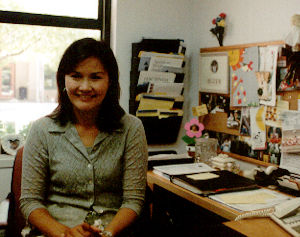Joanne Mik is Making a Difference through Working with Children
Joanne Mik is Making a Difference through Working with Children

Joanne Mik is a bit shy about her accomplishments.
"I get kind of nervous talking about myself," she admits.
Judging from her activities both at the Hacienda Child Development Center and in the community, however, it's clear that her approach to her life's work is anything but shy.
Mik, an East Bay native, currently serves on the Alameda County Child Care Planning Council Steering Committee as well as the Las Positas College/Tri-Valley Regional Occupational Program Early Childhood Development Committee, in addition to her positions with Heads Up! Child Development Centers.
"I had always done volunteer work in my community, and I continued to do that through high school and college," she explains. "I always knew that I was going to make a contribution of some sort."
Her chosen profession reflects that same commitment. After graduating from UC Berkeley in the mid-80's, Mik says, "I wasn't happy with what I had seen happening in terms of care for young children. I thought that early childhood is an important time in a child's life and that good things needed to happen for them."
Naturally, her approach was to dive in.
"I think being idealistic, I thought, 'I'm going to be the one to make a difference!'" she says. "I started teaching pre-school as a way to get involved and continued in that direction ever since."
She started in Hawaii, where her husband a Naval officer was stationed at the time. After returning to the Bay Area, she opened a school-age facility for the YMCA, overseeing everything from the licensing process to the curriculum.
"Establishing a program is a very exciting thing to do, putting in my own personal ideas about what was going to be happening," she says.
From there, she went on as director of Rainbow Bridge, a large school in San Jose, where she remained until 1993.
The birth of her son the previous year led to her move to Hacienda. Mik found that the changes she wanted to make with the Rainbow Bridge program weren't happening fast enough, so Mik left Rainbow Bridge for her current position.
"I would say that for a period of time, I felt that I had sold out I was going to where it was already good," she says.
As it turned out, she couldn't have been more wrong. Instead of having less of an impact, Mik has been able to reach more children than ever before.
"Other centers come and look at us as a model for how to provide programs, so we're able to reach into the community in an even more significant way," she says. "A lot of our head teachers teach adults how to work with children. We have mentor teachers who are training new teachers at Las Positas College. Several more of our head teachers train teachers at the Montessori Training Center. Our staff has taught teachers at Hayward State. Our reach is very broad."
She is careful to avoid taking too much credit for the Center's success, however.
"Probably the one thing that I've provided is a sense of community, so the whole school can feel more in sync," she says. "I think now there's more of a continuum it's a community where there's a lot of support for teachers, a lot of respect, and a sharing of resources. They tend to really rely on each other and use each other for support and as a resource for professional development."
In creating this environment, she's solved a problem encountered by many companies.
"A lot of times people become entrenched in what they're doing and don't see what the big picture is," she explains. "I think (a director's job) is the same at any company, and that really is to be the one to see the big picture and understand that it can't be done by one person, that it's a coordinated effort.
"I think the way you do that is to give the next level of administration which happens to be for me, my head teachers autonomy and responsibility to be able to develop their staff and take pride in the program, understanding that they're pivotal roles."
She finds that employees given greater autonomy and responsibility give more to their jobs.
Her focus is never far from the children, however. "It will probably take a lifetime to change what's happening for the majority of children," she says. "I think that all children should have an opportunity to have a special time in their lives."
Also in this issue...
- Dynegy to Expand in $7.5 Billion Merger
- Foglight's RAPS is Network Insurance
- Business Bits
- Executive Profile - Joanne Mik, Hacienda Child Development Center
- RHI Introduces New Benefits Package with Foothill Fanfare
- Hacienda Offers Easy Access to Historic Livermore Valley Wineries, Vineyards
- ProBusiness Expands to New Facility
- BART Offers New Incentives for Hacienda Commuters
- Sister City Association Sponsors Barbecue
- Hacienda Index




